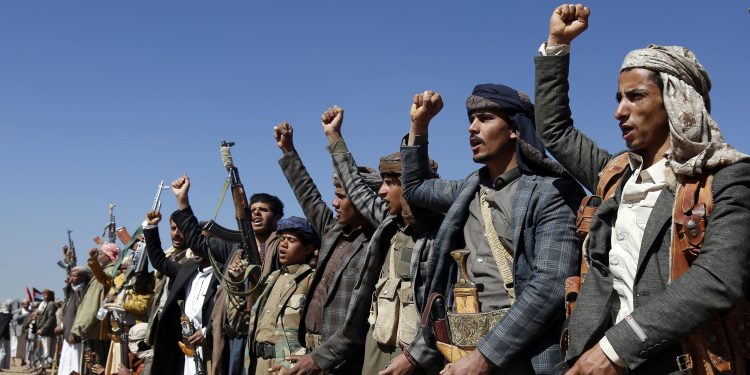September 5, 2024, 3:05 pm
Author – Nick Turse

Yemen’s Iran-backed Houthi rebels attacked two oil tankers in the Red Sea on Monday with ballistic missiles and a one-way attack drone, according to U.S. Central Command, which characterized the strikes as “reckless acts of terrorism.”
The U.S. responded on Tuesday with an airstrike on a “Houthi missile system” that the U.S. claimed “presented an imminent threat to U.S. and coalition forces, and merchant vessels in the region.”
The Saudi-flagged Amjad and the Panama-flagged Blue Lagoon 1 struck on Monday are just the latest ships to be damaged by the Houthi rebels, who have attacked more than 80 merchant vessels since the war in Gaza began in October 2023, and have said the attacks will continue until Israel’s war on Gaza ends.
The Houthi campaign has led to a 90 percent decline in shipping activity through the Red Sea, according to a report from the Defense Intelligence Agency, and shows little sign of stopping, even though two U.S. aircraft carriers are now deployed in the region.
For more than two decades, the United States has been at war in Yemen. In these years, U.S. leaders have talked endlessly about fostering peace, stability, and prosperity in that Middle Eastern nation. “Ultimately, peace in Yemen serves the interest of all Yemenis, just as it does those of our regional partners,” said U.S. Special Envoy for Yemen Timothy A. Lenderking earlier this year. “The United States stands ready to support.”
Despite the rhetoric, the Yemeni people have suffered immensely — and the central target of U.S. military action in the country, the Houthi rebel group, is exerting more influence on the world stage than ever before.
One of the original battlegrounds in the U.S. war on terror, Yemen is just one of many majority-Muslim nations — from Afghanistan and Iraq to Niger and Somalia — ravaged in the forever wars. More than 940,000 people have died in America’s collection of post-9/11 conflicts due to direct violence, almost 4 million have died indirectly from causes like food insecurity and battered infrastructure, and as many as 60 million people have been displaced, according to Brown University’s Costs of War Project.
Since 2002, the United States has conducted nearly 400 attacks in Yemen, ranging from commando raids and drone assassinations to cruise missile attacks and conventional airstrikes. U.S. drone strikes there repeatedly killed and maimed civilians. Other Yemenis, including women and children, were massacred by Navy SEALs in a ground raid in 2017. In the last week, the U.S. military has repeatedly struck targets there.
For years, the U.S. employed a low-profile proxy force to conduct secret counterterrorism missions in Yemen. America also provided weapons, combat training, and “logistical and intelligence support” for the Saudi Arabia-led coalition’s war in Yemen — launched in support of Yemeni President Abd-Rabbu Mansour Hadi, who was overthrown by the Iran-backed Houthi rebels — from 2015 until 2021.
A recent investigation by The Intercept revealed that the kingdom of Saudi Arabia has repeatedly stiffed the Defense Department on a bill for support of that Saudi war that killed hundreds of thousands of Yemenis and sparked a humanitarian catastrophe. For months — up to and since publication — the Pentagon has ducked The Intercept’s requests for comment on the unpaid bill.
Despite the unpaid debt of $15 million — the remaining balance of a $300 million bill for aerial refueling missions which the Pentagon has repeatedly attempted to collect — the Biden administration recently lifted its ban on selling offensive weapons to Saudi Arabia, authorizing an initial shipment of air-to-ground munitions to the kingdom. The restriction did not apply to sales of so-called defensive arms and military services. Those sales have amounted to almost $10 billion over the past four years.
“For decades the United States has supported and partnered with autocrats in the region, arguing that these security relationships and assistance would lead to regional security and stability,” said Seth Binder of the Washington-based Middle East Democracy Center. “Instead, as we’ve seen in Yemen, it has too often brought conflict and immense suffering.” While Binder stressed that the U.S. does not bear most of the blame for the toll suffered by Yemenis, he said “it is undeniable that its policies have had a significant and destabilizing effect.”
The long-running humanitarian crisis in Yemen, despite a cessation in the conflict between the Houthis and Saudi Arabia, is growing worse. Yemen now finds itself on the edge of socioeconomic collapse, its health care system barely functions, and it’s beset by climate shocks and outbreaks of preventable diseases. The Fund for Peace ranks Yemen sixth out of 179 nations on its Fragile States Index, second only to Syria in the Middle East.
At least 17 million Yemenis are now food insecure, including 3.5 million who are acutely malnourished. Around 4.5 million are internally displaced, many of whom have suffered multiple displacements over several years. More than 18 million people, over half of Yemen’s population, require humanitarian assistance.
Fears of a wider regional conflict, stemming from the Gaza war, threaten to worsen an already catastrophic situation. “The regional dimension of the conflict in Yemen is getting more and more pronounced,” Hans Grundberg, U.N. special envoy for that country, advised the U.N. Security Council in July. “I reiterate my warning to the Council that we risk a return to full-scale war and all the predictable human suffering and regional implications this entails.”
Since November 2023, the Houthis have attacked U.S. military forces in the Middle East, including ships and aircraft, as well as commercial shipping in the Red Sea and the Gulf of Aden in reaction to the U.S.-supported Israeli war in Gaza. In response, the U.S. has carried out many strikes against Houthi targets in Yemen, reportedly killing civilians.
Israel and the Houthis have also engaged in tit-for-tat attacks, further widening the Gaza war. Israel is already fighting Hamas on its southern front in Gaza and is regularly trading fire with Hezbollah, another Iran-backed militia, in Lebanon to the north.
After a Houthi one-way drone hit Tel Aviv in late July, the Israeli military attacked Yemen — with U.S.-made F-15 and F-35 fighter jets — hitting the Red Sea port city of Hudaydah and reportedly killing three people and injuring 87. A local official said the attack — the first ever by Israel in Yemen — caused at least $20 million in damage to a port that serves as a key entry point for food, fuel, and aid to already impoverished northern Yemen.
“Yemenis have suffered from war and conflict for far too long,” Binder told The Intercept. “Moments of optimism and hope have often been short lived and sadly, the Houthi response to the Gaza war again risks putting Yemenis through more violence and suffering.”
The post The U.S. Has Been at War in Yemen for 20 Years, but Houthis Can Still Choke the Red Sea appeared first on The Intercept.
Full Article
Author: Nick Turse











